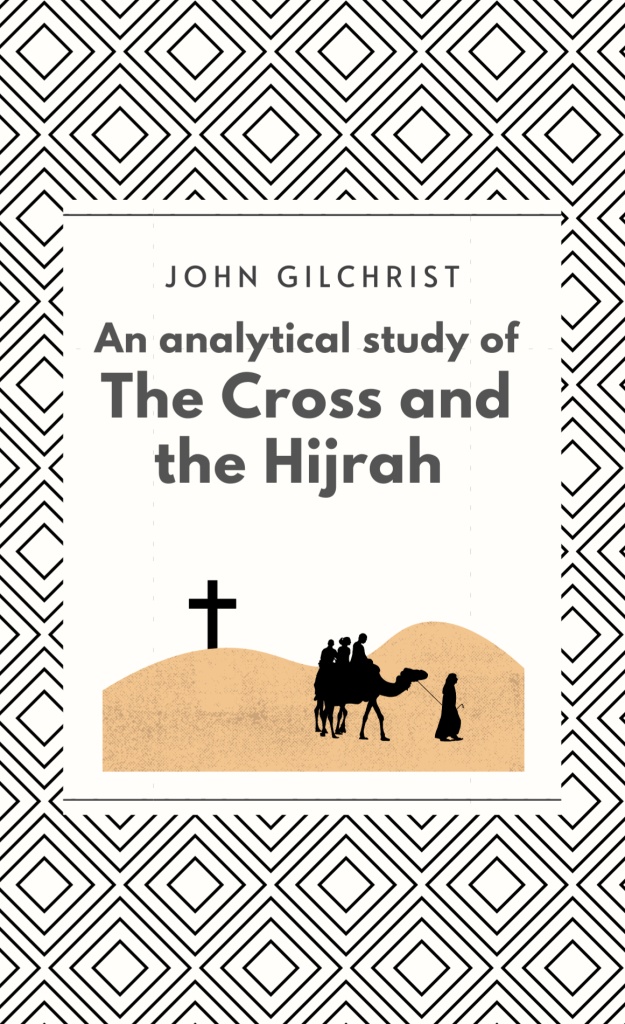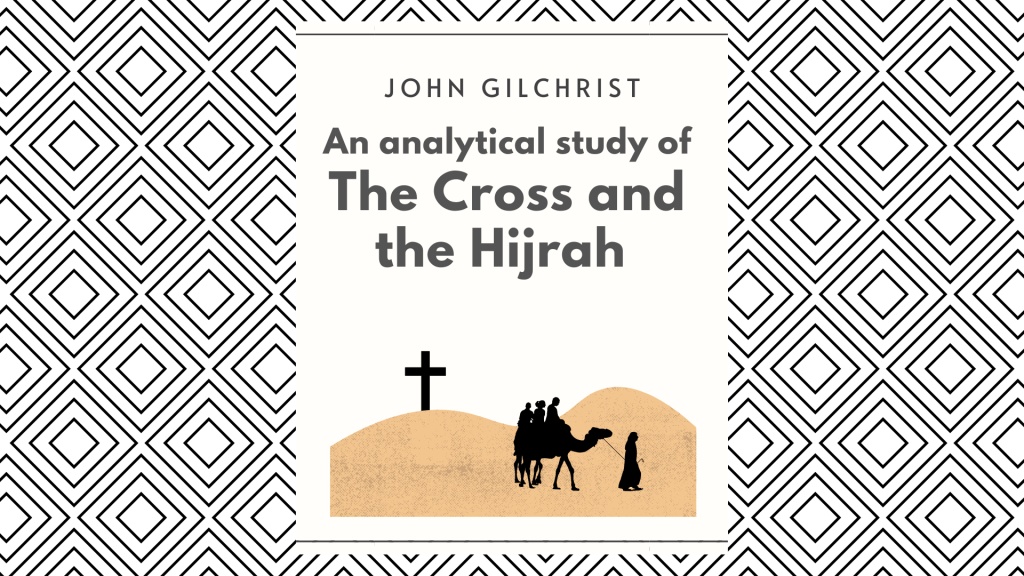Muhammad and the Ummah at Medina
An Analytical Study of the Cross and the Hijrah


Chapters
- Introduction
- The Similarities between Jerusalem and Mecca
- The Opposition to Jesus and Muhammad
- The Ways of Escape Before both Men
- Muhammad and the Ummah at Medina
- The Contrasting Path Chosen by Jesus Christ
- The Cross - the Choice of the Saviour of the World
- The End Result: the Glorious Kingdom of God
« Ch. 4 - The Ways of Escape Before both Men
For many years scholars tended to distinguish between Muhammad as a lonely preacher in Mecca and Muhammad as the head of a community of believers at Medina dedicated to defeating their opponents in Arabia through jihad, religious warfare. It has often been suggested that Muhammad's personality and objectives changed at Medina and that the militant figurehead of a large body of believers in this city compared sharply with the passive preacher at Mecca who patiently endured all the insults heaped on him and the persecutions levelled against his followers.
In more recent years, however, scholars have concluded that there was really no change in the man at all and that the rule he established in Medina and the means it he adopted to enforce and spread its influence had been forming in his mind long before he left Mecca. It is now suggested that the prophet of the Arabs at Mecca was seeking favourable circumstances to employ his ultimate objectives and that the Hijrah was not simply an escape from Mecca but a deliberate stepping-stone towards the establishment of the circumstances Muhammad perceived necessary to bring about the religious order he believed he was called to establish.
A brief study of the teaching of the Qur'an at this point tends to confirm this latter view. The book plainly teaches that it was God's express will to create a well-balanced and stable ummah, a "community" of believers, to be a witness to the nations (Quran 2.143). Furthermore, whereas jihad only became a tenet and regular feature of Islam at Medina in contrast with the situation at Mecca where no Muslim was taught to retaliate against the enemies of Islam, the Qur'an nevertheless places the Hijrah and jihad side by side, indicating that one of the purposes of the escape from Mecca was to establish a better base from which the struggle of jihad against the unbelievers could be launched.
Not long after the Hijrah a party of Muslims made an attack on a small Meccan caravan at Nakhlah near Mecca in which one of the pagan Arabs was killed and two were captured. The Muslims at Medina were surprised at this new venture and were also quite disturbed to find themselves on the offensive against the Meccans. Although they had been the victims of prolonged persecution during Muhammad's preaching years at Mecca, it was not the policy of the Quraysh to put them to death. Now, very shortly after the Hijrah, one of their opponents had been slain by fellow-Muslims and the fledgling community at Medina questioned the wisdom of provoking possible large-scale retaliation from Mecca and the whole prospect of fighting in the way of religion. The following verse in the Qur'an, however, soon came to Muhammad to reassure them:
Fighting is prescribed for you. -- Quran 2.216
The very next verse justified retaliation against the Meccans for denying the Muslims access to the Ka'aba and for the constant oppression heaped upon them and the following verse reads:
Those who believed and those who suffered exile and fought (and strove and struggled) in the path or God, - they have the hope of the mercy of God; and God is Oft-forgiving, Most Merciful. -- Quran 2.218
In the original Arabic the words translated "and those who suffered exile and fought in the path of God" read as follows: wallathiina haajaruu wa jaahaduu fii sabiilillah. It is very significant to see the concept of exile, hijrah, directly linked with that of fighting, namely jihad. Those who have been "exiled" (haajaruu) are also those who have "fought" (jaahaduu) in the way of Allah. The Hijrah was thus merely a stepping-stone towards jihad. It was not only an opportunity to escape for Muhammad but also a means to deal more effectively with those who opposed him. It was the pathway to jihad. Muhammad left Mecca only to take steps immediately to interrupt its trade and ultimately to conquer and subdue it. He escaped from the city that had rejected him only to confront it from Medina.
The growing Muslim ummah at Medina at last found itself able to deal forcefully with those who opposed it. Even though there were hostile elements in the city, both Jewish and Arab, Muhammad gradually asserted his authority. He exiled two of the Jewish tribes and despatched the third after his final confrontation with the Meccans at Medina and although he never fully subdued the Arahs in the citv who were opposed to him. he did eventually annul their influence completely. Even during the period when they sought to undermine his influence they did outwardly swear allegiance to him.
The three confrontations with the Meccans before Muhammad was finally able to conquer Mecca with a superior force in 630 AD all helped the ummah to establish itself. Though outnumbered at Badr in 625 AD the Muslims inflicted a serious defeat on the Meccans, killing a number of their leaders including Abu Jahl who had been one of Muhammad's chief opponents.
The Muslims suffered a reverse at the Battle of Uhud which followed but their security within Medina was unchallenged and when a major effort by the Meccans to drive them out a year later also failed, the ever-growing Muslim community was able to take the offensive and conquer the Meccans.
Many Muslim writers have sought to justify jihad in Islam by suggesting that this applies purely to self-defence and they argue accordingly that all Muhammad's wars including those of his successors (in particular the battles fought during Umar's caliphate which spread the rule of Islam to Egypt, Syria, Iraq and parts of Iran) were purely defensive. We are not concerned to debate this subject here and only wish to note that it is at least admitted that the sword may be unsheathed for the protection of Muslim communities and the faith of Islam.
Muhammad himself saw nothing wrong with the destruction of his enemies by force of arms and the Qur'an itself calls for the demise of his uncle and radical opponent Abu Lahab (Quran 111.1). Muslims themselves were told that every Muslim who died while fighting for Islam was a shahid, a martyr (the word principally means a "witness"), and the Qur'an duly guarantees Paradise to them. A typical passage setting out the benefits of dying while fighting for the faith is this one:
Those who leave their homes in the cause of God, and are then slain or die, - on them will God bestow verily a goodly Provision: Truly God is He Who bestows the best Provision. Verily he will admit them to a place with which they shall be well-pleased: for God is All-Knowing, Most Forbearing. -- Quran 22.58-59.
Significantly the first verse speaks once again of the haajaruu, those who go into exile, and who are then killed (qutiluu) in the way of Allah. The Hijrah thus led directly to the establishment of the initial ummah of believers, a kind of "kingdom of God on earth". The body of believers was thus an earthly community that was entitled and exhorted to defend its identity against all who would oppose it or stand in its way. It was thus clearly Muhammad's objective to establish a theocratic, Muslim state and community and to protect and maintain its identity by fighting those who resisted it.
The later passages of the Qur'an give Muslims the right to take up arms against all-comers who threaten the Muslim ummah and to slay them wherever they be found (Quran 2.190-191). The book even contains an open licence to make war on all who do not acknowledge Islam, including Christians, until they "feel themselves subdued" (Quran 9.29).
It is thus quite apparent what the natural consequence and, indeed, express objective of the Hijrah was. Although the concept of jihad, fighting in the way of God against unbelievers, was a novel one in Arabian society, the principle of faith versus unbelief as a justifiable cause for physical warfare became one of the tenets of Islam. Nonetheless, despite its religious character, the employment of force of arms for the subjugation of opponents, whether in self-defence or otherwise, is historically nothing more than the customary method of establishing an earthly rule. It has been resorted to throughout the ages.
It was this very means which Muhammad adopted to protect the ummah of Islam against its opponents and, when he was strong enough, to subdue them. Its express purpose was to safeguard and expand the visible identity of the people of Islam as a distinct community on earth. The Hijrah led perforce to the concept of what can best be described, in Christian terms, as a visible kingdom of God on earth, and its very character necessitated the use of forceful means to protect its identity whenever this appeared to be threatened.